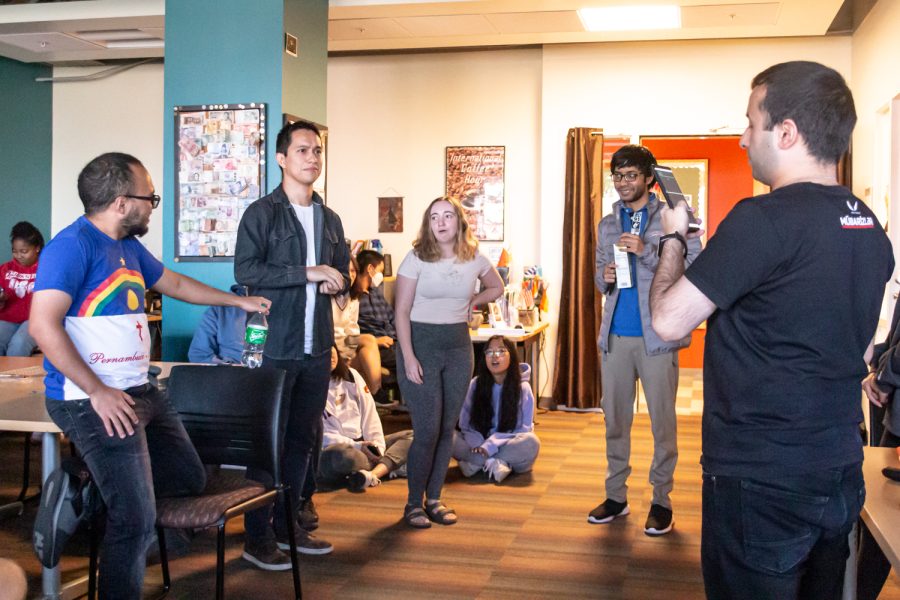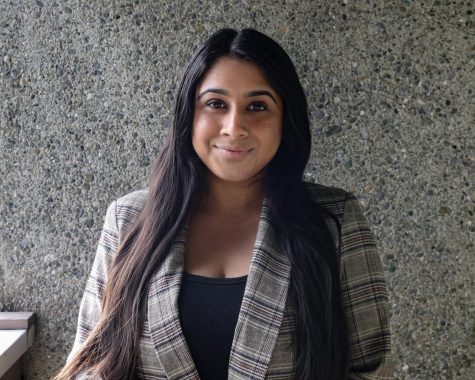Coffee Hour: Azerbaijan
Attendees had opportunity to learn about Azerbaijan
Students play Khamsa after listening to Mammadov’s presentation, Sep 23.
September 26, 2022
As the conflict between Armenia and Azerbaijan made headlines this month, the International Center’s Coffee Hour on Friday educated attendees on the country of Azerbaijan.
Abbas Mammadov, a political science doctoral student from Baku, Azerbaijan, gave an in-depth presentation with topics ranging from the history to the native dishes of his home country.
“When you have enthusiasm, it’s not a problem to put together the slides,” he said. “This is something I’ve been engaged with my entire life.”
The entire space of the center was filled with attendees watching the presentation that started off with the national anthem of Azerbaijan being played. Everyone in the room stood up in respect of the anthem.
“I was so happy to see so many people, I think a few Azerbaijanis go here so it is important to talk about my country,” Mammadov said.
He began the presentation by speaking about the significance of the colors on the Azerbaijan flag; the blue represents the country’s Turkish origins, the green represents Islam, which is the main religion, and red signifies prosperity and democracy.
Mammadov said that for those who do not know, various regions, as well as the Caspian Sea, surround Azerbaijan. The country is a neighbor of Armenia, Iran and Georgia.
The origin of Azerbaijan began in the seventh century with the country’s conversion to Islam. From then on, Mammadov spoke about different dynasties such as the Safavid dynasty.
From 1920-91, Mammadov said that Azerbaijan was in the USSR and they were a communist country for a time.
“We knew [Mammadov] wanted to present for a long time so this was the perfect opportunity,” said junior Chiara Edah, an international business student who works at the International Center.
The geography in Azerbaijan is diverse and full of richness, said Mammadov, with the country having all four seasons. There are many mountains and people who live in those territories are called Caucasians.
Slides of different cities in Azerbaijan were presented as well as the celebration ofNovruz, the traditional New Year in the country.
Similar to various Asian and European countries, tea is a necessity to Azerbaijanis and every year they hold the International Tea Festival in Baku.
Mammadov presented slides about popular foods such as plov, a rice based dish with various vegetables and spices.
“Usually people are dozing off, so this is the best presentation we’ve had. I think everyone really learned something,” Edah said.
If anyone wants to visit Azerbaijan, then they should visit the Azerbaijan Carpet Museum or Qiz Qalasi, or the Maiden Tower, in Baku. The Formula One Grand Prix is also held in Baku, Mammadov said.
At the end, a shortened version of the question and answer game called Khamsa was played and the attendee who answered the most questions correctly would win a prize.
Gabriel Monteiro Mendes, an economics major, won first place and received a water bottle from the International Center as a prize.
“I found [the presentation] important because I feel smaller states like Azerbaijan has lots of millions of people that people don’t know about,” he said.
Mendes said that even though there have been problems in the country internally and externally, and that history has not been nice to Azerbaijanis, having someone like Mammadov coming in to present and share is important.
The next coffee hour will be on Friday, and attendees will have the opportunity to bring in food from their native countries for everyone to try.











